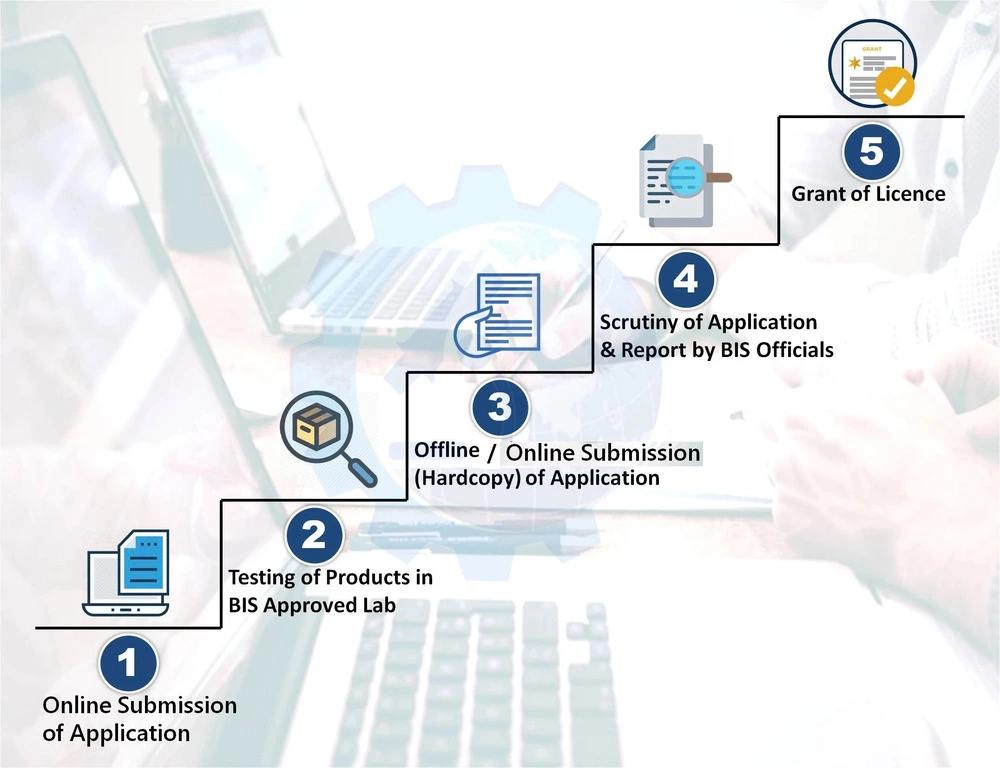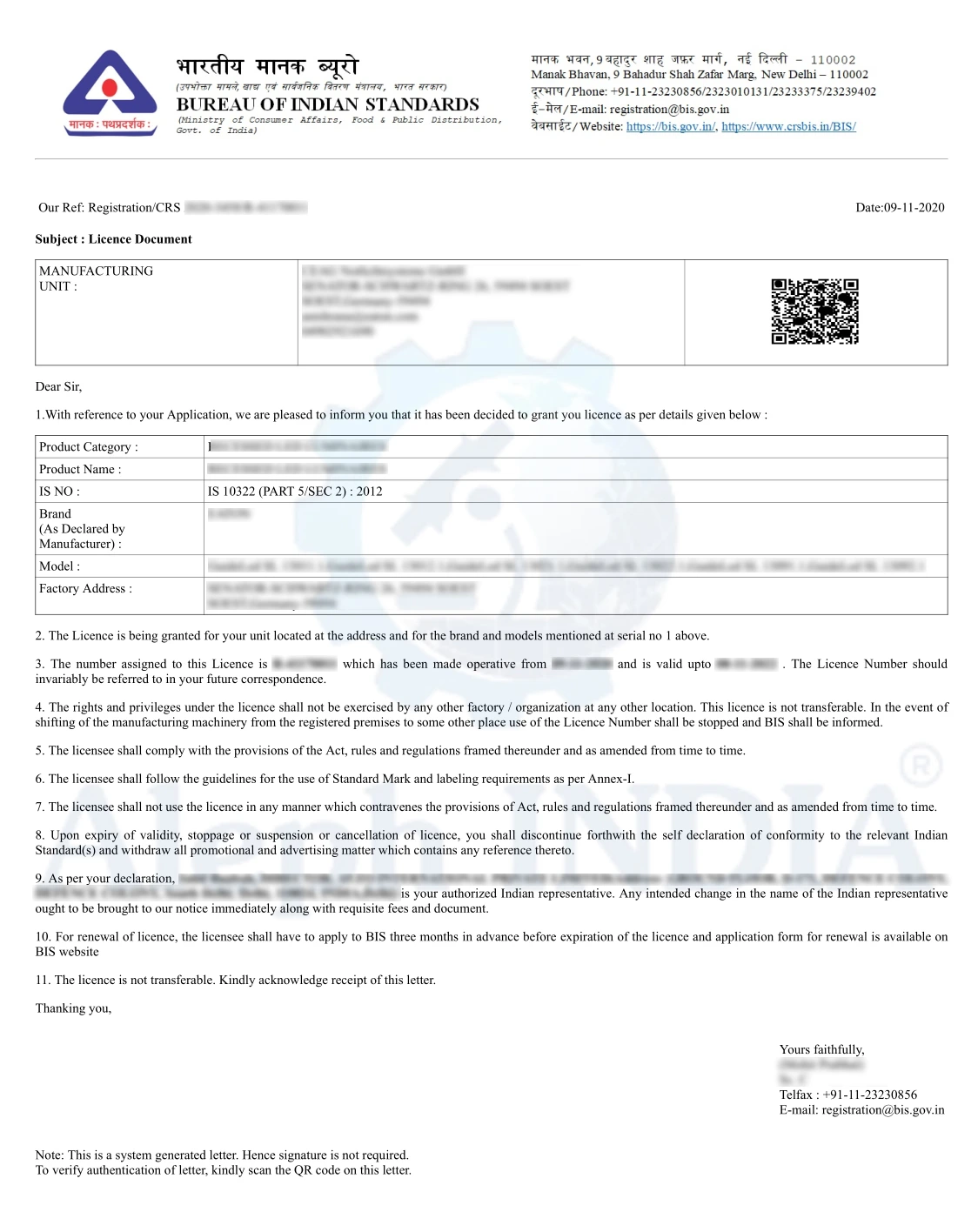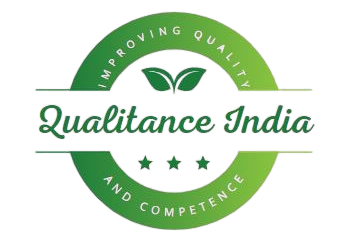BIS REGISTRATION FOR ELECTRONIC & IT PRODUCT
INTRODUCTION
BIS Registration is getting a license from the Bureau of Indian Standards (BIS) for any product that conforms with the applicable Indian Standards. The Bureau of Indian Standards is the National Standards Body of India established under the Bureau of Indian Standards Act, 2016, under the Indian Ministry of Consumer Affairs, Food & Public Distribution, Government of India. The BIS is involved in various activities like Standards Formulation, Product Certification, Testing, Training Services, Hallmarking, Laboratory Services, Calibration Schemes, etc. The BIS registration acts as a third-party assurance of product quality, safety, and reliability.
The Bureau of Indian Standards grants licenses to the manufacturers for their products listed in BIS’s mandatory or voluntary certification schemes. A manufacturer can display the standard mark on their product after obtaining a license from BIS. Although obtaining a BIS license is voluntary, the Indian government has made certain products mandatory to protect the environment, public health, national security, and the welfare of people, animals, and plants. It also aims to prevent unfair trade practices.
“Meet BIS standards, the mark of trust; Manufacture with precision, products robust;
Market expansion, with certification in hand;
Mastery over compliance, in the Indian market you’ll stand;
And growth and prosperity will be your brand.”
BIS Registration, or significant quality control compliance, is necessary when discussing electronic and IT products. This page will give you complete knowledge about BIS Registration under the Compulsory Registration Scheme (CRS) on this page. Let’s examine the nature, organs, and history of the BIS License to understand the necessity of BIS registration certification.
Let’s understand the BIS Registration for Electronics and IT Products.
COMPULSORY REGISTRATION SCHEME (CRS)
In 2012, the Department of Electronics and Information Technology (DeitY) and the Bureau of Indian Standards (BIS) jointly introduced the Compulsory Registration Scheme (CRS) to safeguard Indian consumers against counterfeit and substandard goods. Electronic and IT products fall under the BIS CRS scheme. As per this scheme, a BIS license is mandatory for electronics and IT products before launching them into the market.
The Ministry also issued Compulsory Registration Orders, which state that no one shall manufacture or store for sale, sell, import, or distribute goods that do not meet the Indian standards outlined in the order and do not bear the Standard Mark with a unique registration number.
Under the Compulsory Registration Scheme (CRS), the Bureau of Indian Standards issues a BIS registration certificate to manufacturers to use a standard mark with a unique registration number on their electronics and IT products. BIS Registration is based on your self-declaration of conformity for goods and articles as per Indian Standards. BIS licenses provide third-party assurance to the consumers that the product complies with the quality standards required by law and is safe to use. BIS Licence for electronic products and their operation is governed by the conformity assessment scheme outlined in Scheme II of Schedule II of the BIS (Conformity Assessment) Regulations, 2018.
We know that so many questions are tingling in your mind at this moment, but don’t worry. Let’s have a look at the complete BIS Registration process (BIS registration Requirement/Procedure/timeline/Cost).
Products covered under Compulsory Registration Scheme
To be precise, 79 categories of products have been covered under CRS till now, 63 of which were added by MEITY, five by MNRE, and eight by MHIPE. If you are a manufacturer of any electronic or IT products, we are sure that you are willing to know your product’s specifications and Indian Standards. BIS Mandatory product list is given at the end of this article. You can learn more by searching the product names or Indian Standards at the end of this article for products covered under BIS compulsory registration scheme. If you have any queries regarding the latest update about BIS registration license, kindly email us at inbox@alephindia.in
BIS REGISTRATION PROCESS UNDER COMPULSORY REGISTRATION SCHEME(CRS)
The BIS Registration procedure in accordance with the BIS CRS Scheme is given below.
- Online application submission: First, the Applicant shall apply on the BIS online CRS portal by filling out the BIS registration form in order to get login credentials.
- Testing of product in BIS approved lab: Applicants need to generate test requests by logging in with their credentials and getting their product tested from a BIS-approved lab.
- Offline/online submission of Application: After that, the Applicant must apply on the portal using the verified Test Report within 90 days of its issue and submit all required documents in accordance with the checklist.
- Scrutiny of application: BIS officials will review the test report and all documents submitted with the application.
- Grant of BIS license: Bureau will grant a BIS license to the manufacturers to use or apply Standard Mark with a unique R-number on their electronics and IT products.

Sample of a Grant Certificate for CRS

BIS Registration Requirements
The following are the essential requirements for BIS registration under CRS:
- First of all, if you are a manufacturer of any product covered under the CRS Scheme, then registration is required for that product before launching them into the market.
- The manufacturer seeking to register to use or apply BIS Standard Mark on their product shall conform to the requirements of Indian Standard Specifications.
- A BIS license will be granted to you by BIS based on your self-declaration of conformity of the product with the application you are submitting.
- This self-declaration of conformity from you indicates that your manufacturing infrastructure can produce quality products with the necessary testing facilities, which can only test the products in the prescribed period at your premises.
